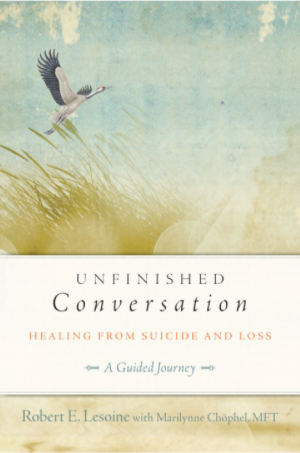Personal Stories

We invite you to share your grieving and healing journey, as well as any inspiration and resources that made a difference for you along the way. Send us links to articles, news stories, poems, songs, workshops, conferences, etc. that could be of benefit to others.
Click here to share your personal journey of healing, resources, or inspiration.
Click here to share your review of the book Unfinished Conversation on our Amazon page.
Personal Stories
Creating a Companionship With Grief.
—An interview with CNN’s Anderson Cooper speaking with Francis Weller PhD, author of The Wild Edge of Sorrow: Rituals of Renewal and the Sacred Work of Grief. Anderson Cooper lost his brother to suicide when his brother was 23. (video, 30 min. 2024.)
For the Living
It is the work of the living
to grieve the dead.
It is our work to wake each day,
to live into the world that is.
It is our work to weep,
and it is our work to be healed.
Some part of us knows
not only the absence of our beloveds,
but also their presence,
how they continue to teach us,
how they invite us to grow.
It is our work to be softened by loss,
to be undone, destroyed, remade.
Wounded, we recoil,
and it is our work to notice how,
like crushed and trampled grass,
we spring back.
It is our work to meet death again
and again and again,
and though it aches to be open,
it is our work to be opened,
to live into the opening
until we know ourselves
as blossoms nourished from within
by the radiance of the ones
who are no longer physically here.
They have given us their love light to carry.
It is our work to be in service to that light.
—Rosemerry Wahtola Trommer, poet, teacher, and storyteller who lost her son to suicide when he was 16.
Rosemerry’s Website. A Daily Dose of Poetry by Rosemerry. Subscribe to Rosemerry’s Poem a Day
I came upon your beautiful, compassion-filled book at a hospice in Colorado. I lost my long-term boyfriend and best friend Brad to suicide in March 2016. The exercises in your book have been a blessing as they’ve taught me positive ways to honor and remember, connect with and also let go of Brad on my own. Robert’s touching memories of Larry helped me understand Brad’s state of mind and the darkness he suffered with. It is not easy to lose someone we once shared such a deep connection with. Your book is the best I’ve read so I’ll be buying a copy to keep for reference. Thank you.
—C.K. Loss of partner and best friend.
A very honest and inspiring presentation about her healing journey with mental illness and suicide. Keynote speech at the AFSP Out of the Darkness walk in Sacramento, October 4, 2014.
Watch Video (11 minutes.)
—Katie Williams, Graduate Student at Sacramento State University.
Already, your book has been helpful not only to me but also to several of my clients. I actually lost a client to suicide and have wondered how many clinicians out there have had similar experiences without a lot of “professional” networks of support. Below is the blog post I wrote about your wonderful book. Thank you!
As of late, unfinished conversations abound in my life. I have had clients seeking peace and forgiveness via dialogues with departed family members as well as those who are alive but inaccessible for any number of reasons. I also have been reckoning with my own unfinished conversations, particularly with someone who died at their own hand. With gratitude, then, I came upon Robert Lesoine and Marilynne Chöphel’s Unfinished Conversation: Healing from Suicide and Loss.
For those of us feeling adrift from an unexpected loss or any relationship that raises a storm of emotions once we give it attention, this book provides amazing resources. In it, Lesoine allows us to witness his grieving process following the suicide of his best friend. He illustrates the panoply of emotions that spiral in and out of his immediate experience–sadness, outrage, fear, regret, guilt, loneliness, and abandonment to name a few–as well as his gradual move toward curiosity, acceptance, and letting go. Lesoine’s written dialogues with Larry facilitate this journey and, as he notes, rekindle a connection with his deceased friend.
His co-author Chöphel, a trauma specialist and longtime therapist, contributes additional tools for healing throughout the book. For example, the following “Getting Real Journal Exercises” focuses on working with remorse:
“Getting real with yourself means noticing–with courageous honesty–your actions and feelings, even difficult feelings such as guilt and genuine remorse. Write a dialoge in which you express your regrets and see what the response of your loved one might be. Write a scenario in your journal in which you and your loved one both take responsibility, make amends, and experience deeper understanding and reconnection with each other.”
I was moved by the authors’ creation of space for whatever arose for Lesoine and their insistence that grief does not come in right and wrong forms. I also appreciated that the book followed Lesoine for over a year, giving me a window into how my own grief might shapeshift across time, if I allow it to do so. I found his continuous opening toward Larry and himself particularly beautiful. Toward the end of the book, for example, Lesoine desires to let go of his suffering by forgiving Larry and himself. As he writes,
“Eventually, I come to recognize that to truly heal, I also need to directly ask for Larry’s forgiveness. Larry, my friend, for all the ways I may have caused you pain through my judgment, outrage, hurt, and confusion, for all the ways I acted or failed to act, I ask for your forgiveness. For all the ways I pushed you out of my heart and made you wrong and bad, for all the ways I judged and was critical of you, I ask you now to forgive me. Please my brother, forgive me.
And I need to forgive myself as well, for all of the shame, self-judgment, and reactive anger; for the ways I have abandoned and not cared for myself; and for the relentless critical self-talk and guilt that have plagued me since Larry’s death. In order to truly heal, I have to be willing to let all that go and welcome myself back into my own heart, as if welcoming home a guest who has been away for too long. I need to say, ‘I forgive you,’ to myself.”
Upon reading this book, I found my own heart releasing its grip on the pain of the last few months and embracing the words of poet Rabindranath Tagore, which Lesoine includes in the epilogue:
Peace, my heart,
Let the time for parting be sweet.
Let it not be a death, but completeness.
Let love melt into memory
And pain into songs.
Let the flight through the sky end
In the folding of the wings over the nest.
Let the last touch of your hands
Be gentle like the flower of the night.
Stand still, oh beautiful end,
For a moment,
And say your last words in silence.
I bow to you and hold up my lamp
To light you on your way.
—Connie North PhD, MS MFT, Individual, Relational, & Family Therapist. Loss of a client.
www.connienorth.com
My mother, who is reading Unfinished Conversation, said: “It makes you feel better to read about someone else who felt the same way.” She has referred to the book several times, about ways in which she has discovered her own story in the book. Thank you. I think this is helping free her from the burden she has carried all these years. She’s now 97.
—S.A. Loss of sister.
This is exactly the kind of book I was looking for when I experienced the heart-wrenching loss of my daughter to suicide fifteen years ago. Robert shares his personal journey through grief with a profound and anguished honesty. Unfinished Conversation offers hope for healing and the possibility that great suffering can be transformed. I recommend this thoughtful and heartfelt book to other survivors searching for a way through the dark valley of grief.
—Nancy Coughlan, Bereaved Parents Support Group Facilitator. Loss of daughter.
I commend you both for the honesty in your book, and I truly think it will be a valuable resource for those who have lost a loved one to suicide. The grief journey can be both paralyzing for a survivor, and at the same time, like a river of thick soup; grieving the loss of a loved one to suicide can be at times, a journey you feel like no one else has been on, and no one else can understand. Yet, your insight with the journal writings, and allowing the survivor to understand the suicidal person, is, in my mind, a tremendous resource for those who are struggling to make sense of something that just doesn’t make sense; it explains the inexplicable, and brings comfort to those who are grieving, while allowing them to begin their own journey of grief and healing.
—BJ Ayers, Executive Director and Founder, Grace for 2 Brothers Foundation. Loss of two sons.
What really captivated me about Unfinished Conversation was the truth behind the writer’s feelings and human experience with suicide. There was no filter on his feelings and emotions, and that made it feel more real. There were moments where it took my breath away and I thought he really didn’t just say that, but honestly it was very true to how emotional I have felt many times. I appreciate you sharing it with me. I was interested to see that my mom connects with it and has been answering the questions and finding it valuable.
—M.P. Loss of father. Member of the Mormon faith, Utah
This book is a comprehensive toolbox for managing the sudden, violent loss that is suicide. My father committed suicide and murdered my mother after 49 years of marriage. My solo show was cathartic and healing, but this book would have helped me a lot. We need all the help we can get to stay sane in the face of suffering.
—Marilyn Pittman, Actor, Radio Host, Creator of the award-winning 2011 Off-Broadway production “It’s All The Rage.” Loss of father.
Unfinished Conversation is just what we survivors need: a safe, enlightening, guided path into and through our fear and grief.
—Beverly Cobain RN, author of When Nothing Matters Anymore and co-author of Dying to Be Free.
Loss of cousin, Kurt Cobain, lead singer of the band Nirvana, who died from suicide in 1994.
Twenty-five years ago my sister took her own life. Recently I began working with the exercises for survivors in Unfinished Conversation. Guided by the questions, I was able to remember and release some deep unhealed grief and move on in my own life in a new way, deepened and transformed by my journey into and out of profound grief. I look forward to sharing this book with my 95-year-old mother. I am now using the book with a support group I facilitate for survivors of suicide loss, confident that this journey will lead them to genuine healing.
—Shoshana Alexander, Facilitator of survivors’ support group. Loss of sister.
Co-author, Awakening Joy: 10 Steps That Will Put You on the Road to Real Happiness.
Click here to share your story.


